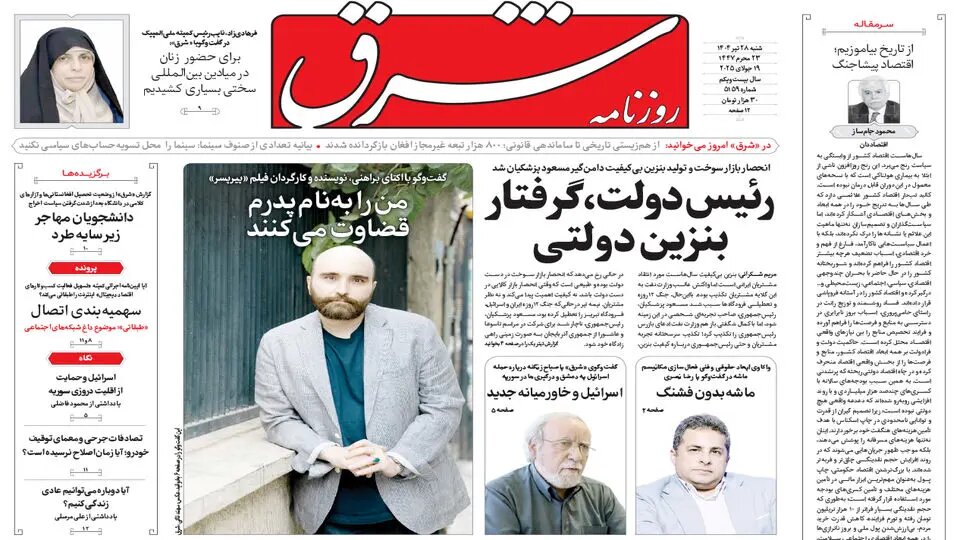The policy of threats and pressure continues

TEHRAN - In an analysis, Shargh analyzed the official telephone talks between the foreign ministers of Iran and the European trio of Britain, France and Germany.
The paper said: This call was the first direct dialogue after the recent military aggression against Iran's nuclear sites, which clearly showed two different positions: on one side, Europe and the West, threatening to reactivate the UN sanctions, want to advance negotiations as quickly as possible and put more pressure on Iran; on the other, Iran insists on adhering to its principles and calling for the revival of negotiations in a format that ensures mutual benefits. Europe's emphasis on the snapback mechanism could fuel increased tensions and make the atmosphere for negotiations more difficult. Rather than being the beginning of a new chapter in diplomacy, this call is a reflection of diplomatic confusion and a deep gap in trust between the parties. The future of this process depends on the seriousness and courage of the parties in overcoming the shadow of punitive policies and returning to the logic of dialogue; a dialogue that, if it is to be fruitful, must be based on mutual respect, realism, and lessons from the past.
Sobh-e-No: A message to the West about Iran's policies
In an article, Sobh-e-No discussed Araghchi's visit to China and his declaration of solidarity with countries opposing the policies of the United States and Israel. It wrote: Araghchi's words regarding the support by the Shanghai Organization and other international organizations for Iran against the aggressions of the Zionist regime and the United States send an important message to the international community. Iran strongly calls on global and regional organizations to stand against unilateral actions and foreign threats against countries that pursue their interests. This message, in addition to expressing solidarity with independent countries, is also considered a kind of opposition to the policies of the United States and Israel. Araghchi's visit and his talks with SCO counterparts sent a message for Western countries, especially the United States. By emphasizing the development of its relations with China, Russia, and other Asian countries, Iran is demonstrating that it does not accept any dependence on the West, especially the United States. This message warns Western countries that Iran is strengthening its relations with other world powers and that no amount of economic or political pressure can divert Iran from its path.
Javan: Negotiation is a tool at the right time
Javan wrote about the possible resumption of nuclear negotiations: It is clear that the official policy of the Islamic Republic of Iran towards negotiations is still cautious, conditional, and completely dependent on the decisions of the highest levels of the establishment. It seems that Iran's hands are now much fuller than when Iran's nuclear facilities were not bombed. Some believe that Iran's hands are empty after these bombings, and the United States and the West no longer have a reason to negotiate and lift sanctions. Perhaps they will cite Trump's recent words, in which he said that he is in no hurry to negotiate and that it is the Iranians who should take the lead. The Europeans have also expressed a similar idea and believe that it is Iran that should request negotiations. But if that were the case, there would be no need for Europe and America to repeat this claim. Therefore, Iran's hands are still full, full of logic and military force; and negotiations still have their logic. The country’s decision should be made at the best time and place. Europe and America, if they do not see the need to negotiate with Iran and see Iran empty-handed, can remain silent and show off their uselessness.
Donya-e-Eqtesad: Complicity in the crime
In a note, Donya-e-Eqtesad discussed America’s complicity in Israel’s crime against Iran and violating international law. It said: America not only did not condemn Israel’s last month attack on Iran’s nuclear facilities, but also brazenly joined the attack using B-2 bombers armed with bunker-busting bombs. Donald Trump, with ridiculous self-glorification, called these attacks very successful and claimed that Iran’s nuclear plants had been “obliterated”. This attack, which targeted facilities under the supervision of the International Atomic Energy Agency, was a clear violation of UN Security Council Resolution 487 and the international laws that America once claimed to defend. In response to the aggression, Iran suspended its cooperation with the IAEA, mulled withdrawing from the NPT, and brought the region to the brink of full-scale war with missile attacks on Israel. Russia, China, and the Organization of Islamic Cooperation condemned this crime as a sign of the West’s shameless hypocrisy. America, which in 1981 proclaimed as defender of diplomacy, in 2025 became a full-fledged partner in violating the very principles it once so vehemently defended.
Leave a Comment